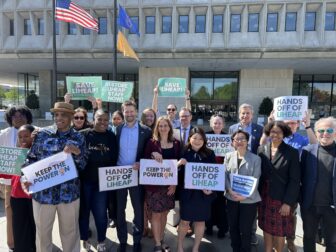The Chesapeake Climate Action Network today applauded Governor O’Malley for signing into law legislation to combat global warming and create green jobs in Maryland. The Greenhouse Gas Emissions Reduction Act, SB 278/HB 315, mandates the strongest economy-wide reduction in global warming pollution of any climate bill in the country.
Advocates Challenge Congress to Enact Nationwide Climate Legislation
ANNAPOLIS -The Chesapeake Climate Action Network today applauded Governor O’Malley for signing into law legislation to combat global warming and create green jobs in Maryland. The Greenhouse Gas Emissions Reduction Act, SB 278/HB 315, mandates the strongest economy-wide reduction in global warming pollution of any climate bill in the country.
“This is a landmark moment for Maryland and sends an urgent message to the federal government,” said Mike Tidwell, director of the Chesapeake Climate Action Network. “Maryland has done all it can do, now it’s time for Congress to enact a nationwide cap on carbon.”
The bill requires the state to cut greenhouse gas emissions 25% below 2006 levels by 2020 and directs the Maryland Department of the Environment to craft a plan and a timeline to achieve that goal. With this bill, Maryland joins six states in enacting a legally binding goal for emissions reductions. Maryland’s short term target is the strongest of all the states with legislative commitments to reduce pollution.
Governor O’Malley’s signing of the Greenhouse Gas Emissions Reduction Act today was the culmination of years of sustained efforts from dedicated citizens, business leaders, environmental groups, and religious and health organizations.
The diverse coalition that formed to raise awareness of Maryland’s climate bill included the Chesapeake Climate Action Network, Environment Maryland, the Maryland Student Climate Coalition, the Chesapeake Sustainable Business Alliance, Physicians for Social Responsibility, the Lutheran Office on Public Policy, Maryland League of Conservation Voters, the Maryland chapter of the Sierra Club, and other groups.
The bill signed today is similar to last year’s Global Warming Solutions Act, which did not make it out of the 2008 General Assembly session. The bill that eventually passed was a result of a series of facilitated talks between stakeholders. Leaders within the Maryland climate movement spent several months participating in talks to work out an effective, fair agreement with union and business leaders.
###




